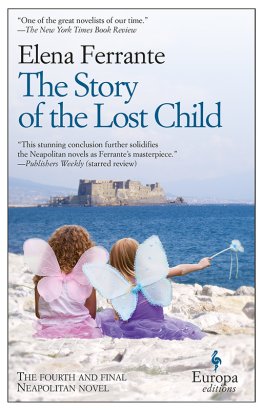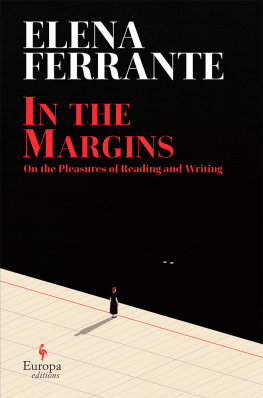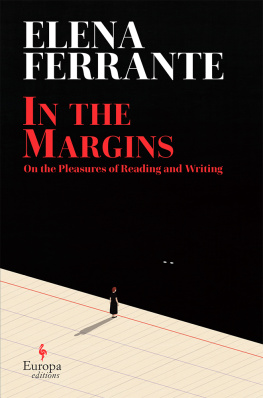O ne April afternoon, right after lunch, my husband announced that he wanted to leave me. He did it while we were clearing the table; the children were quarreling as usual in the next room, the dog was dreaming, growling beside the radiator. He told me that he was confused, that he was having terrible moments of weariness, of dissatisfaction, perhaps of cowardice. He talked for a long time about our fifteen years of marriage, about the children, and admitted that he had nothing to reproach us with, neither them nor me. He was composed, as always, apart from an extravagant gesture of his right hand when he explained to me, with a childish frown, that soft voices, a sort of whispering, were urging him elsewhere. Then he assumed the blame for everything that was happening and closed the front door carefully behind him, leaving me turned to stone beside the sink.
I spent the night thinking, desolate in the big double bed. No matter how much I examined and reexamined the recent phases of our relationship, I could find no real signs of crisis. I knew him well, I was aware that he was a man of quiet feelings, the house and our family rituals were indispensable to him. We talked about everything, we still liked to hug and kiss each other, sometimes he was so funny he could make me laugh until I cried. It seemed to me impossible that he should truly want to leave. When I recalled that he hadnt taken any of the things that were important to him, and had even neglected to say goodbye to the children, I felt certain that it wasnt serious. He was going through one of those moments that you read about in books, when a character reacts in an unexpectedly extreme way to the normal discontents of living.
After all, it had happened before: the time and the details came to mind as I tossed and turned in the bed. Many years earlier, when we had been together for only six months, he had said, just after a kiss, that he would rather not see me anymore. I was in love with him: as I listened, my veins contracted, my skin froze. I was cold, he was gone, I stood at the stone parapet below SantElmo looking at the faded city, the sea. But five days later he telephoned me in embarrassment, justified himself, said that there had come upon him a sudden absence of sense. The phrase made an impression on me, and I had turned it over and over in my mind.
Long afterward, he had used it again. It was about five years ago, and we were seeing a lot of a colleague of his at the Polytechnic, Gina, an intelligent, cultivated woman from a well-off family, who had been recently widowed and had a fifteen-year-old daughter. We had moved a few months earlier to Turin, and she had found us a beautiful house overlooking the river. On first impact, I didnt like the city, it seemed to me metallic; but I soon discovered how pleasant it was to watch the seasons from the balcony of our house. In the autumn you could see the green of the Valentino grow yellow or red; the leaves, stripped by the wind, sped through the foggy air, and trailed over the gray surface of the Po. In the spring a fresh, sparkling breeze came from the river, animating the new shoots, the branches of the trees.
I had quickly adapted, especially since mother and daughter immediately did everything they could to alleviate any discomfort, helping me get to know the streets, taking me to the best shops. But these kindnesses had an ambiguous source. There was no doubt, in my mind, that Gina was in love with Mario; there was too much flirtatiousness, and sometimes Id tease him outright, say to him: your fiance called. He defended himself with a certain satisfaction, and we laughed about it together, but meanwhile our relations with the woman grew closer; not a day passed without her calling. Sometimes she asked him to go with her somewhere, or she would involve her daughter, Carla, who was having trouble with her chemistry assignment, or she was looking for a book that was no longer available.
On the other hand, Gina could behave with impartial generosity; she always had little gifts for me and the children, she loaned me her car, she often gave us the keys to her house near Cherasco, so we could go on the weekend. We accepted with pleasure; it was nice there, even if there was always the risk that mother and daughter would suddenly appear, turning our family routines upside down. But a favor has to be answered by another favor, and the courtesies became a chain that imprisoned us. Mario had gradually taken on the role of guardian for the girl; he went to speak to all her professors, as if standing in for the dead father, and although he was overburdened with work, at a certain point he had even felt obliged to give her chemistry lessons. What to do? For a while I tried to keep the widow at a distance, I liked less and less the way she took my husbands arm or whispered in his ear, laughing. Then one day everything became clear to me. From the kitchen doorway I saw that little Carla, saying goodbye to Mario after one of those lessons, instead of kissing him on the cheek kissed him on the mouth. I immediately understood that it wasnt the mother I had to worry about but the daughter. The girl, perhaps without even realizing it, and who knows for how long, had been assessing the power of her swaying body, her restless eyes, on my husband; and he looked at her as one looks from a gray area at a white wall struck by the sun.
We discussed it, but quietly. I hated raised voices, movements that were too brusque. My own family was full of noisy emotions, always on display, and Iespecially during adolescence, even when I was sitting mutely, hands covering my ears, in a corner of our house in Naples, oppressed by the traffic of Via Salvator RosaI felt that I was inside a clamorous life and that everything might come apart because of a too piercing sentence, an ungentle movement of the body. So I had learned to speak little and in a thoughtful manner, never to hurry, not to run even for a bus, but rather to draw out as long as possible the time for reaction, filling it with puzzled looks, uncertain smiles. Work had further disciplined me. I had left the city with the intention of never returning, and had spent two years in the complaints department of an airline company, in Rome. After my marriage, I had quit and followed Mario through the world, wherever he was sent by his work as an engineer. New places, new life. And to keep under control the anxieties of change I had, finally, taught myself to wait patiently until every emotion imploded and could come out in a tone of calm, my voice held back in my throat so that I would not make a spectacle of myself.
That self-discipline turned out to be indispensable during our little marital crisis. We spent long sleepless nights confronting one another calmly and in low voices in order to keep the children from hearing, to keep from saying rash words that would open incurable wounds. Mario had been vague, like a patient who is unable to enumerate his symptoms precisely; I never managed to make him say what he felt, what he wanted, what I should expect for myself. Then one afternoon he came home from work with a look of fear, or maybe it wasnt real fear, but only the reflection of the fear that he had read in my face. The fact is that he had opened his mouth to say something to me and then, in a fraction of a second, had decided to say something else. I realized it, I seemed almost to see how the words were transformed in his mouth, but I had quelled my curiosity to know what words he had renounced. It was enough to note that that painful period was over, that it had only been a momentary vertigo. An absence of sense, he explained, with unusual emphasis, repeating the expression he had used years before. It had possessed him, taking away the capacity to see and feel in the usual ways; but now it was over, the turmoil was gone. The next day, he stopped seeing both Gina and Carla, ended the chemistry lessons, returned to being the man he had always been.














